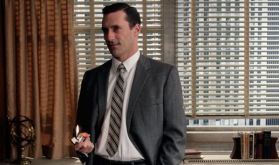The Secret of Joe Biden.
Posted: April 1, 2010 Filed under: Did I Just See That? 1 CommentVodpod videos no longer available.
Sometimes a cigar is just a cigar, said Sigmund Freud, but implicit in his remark was that this was the exception. Far more commonly, a cigar is not just a cigar; our actions have meanings beneath the surface. These meanings may be ulterior motives, or they may be unconscious ones.
I believe that Joe Biden’s actions reveal over and over again that he believes he ought to be president and deeply resents the man who is.
The latest example of this happened last week, when he made his latest “gaffe” on the occasion of Obama’s signing of the new health care reform bill. After introducing Obama, Biden stepped away from the mike — but not far enough away from it — to mutter in the President’s ear, “This is a big f*****’ deal.”
He meant to sabotage the moment. Fortunately, the Republicans don’t seem to have made too big a deal of it, and the Democrats have decided to “own” the gaffe, printing up, for donors giving at least $25, t-shirts that say “Health Reform is a BFD.” But that doesn’t mean Biden’s goof was an innocent one.
First of all, it flirted with ruining, or at least blemishing, an occasion that meant everything to the Obama Presidency.
Second, it was condescending. Biden’s entire introduction, in fact, was condescending. By addressing his remarks directly to Obama in a manner that repeatedly underlined the enormity of the accomplishment, Biden implied that Obama himself did not have the perspective necessary to appreciate its enormity. That he felt it necessary to put the icing on the cake with his “big f*****’ deal” remark was the ultimate insult. Did Biden really believe that Obama, who worked longer and harder to get health care reform than any president before him, and who, to do so, withstood with statesmanlike grace enormous abuse unmatched by that any previous president has known — did Biden really believe that Obama was himself ignorant of the scope of the accomplishment, did not realize just how big an effin’ deal it was? Incredible as it may seem, I think that Biden in fact did think Obama needed his help in seeing this big picture, because I think Biden devalues Obama. Biden still can’t get over that this guy with relatively little experience is president, and not Joe Biden.
But all of Biden’s gaffes, those within the President’s earshot and those away from it, are clues to his arrogance. His is the arrogance of the guy who belittles someone by pointedly getting his name wrong, or who “forgets” that a man is in a wheelchair and can’t stand up when called upon, or who shows contempt for his audience when arriving late to a speaking engagement by muttering “give me a f*****’ break” as he takes the podium, or who underlines the inexperience of his running mate during a campaign by promising an “international crisis” within the first six months of his running mate’s presidency. These things, added up and seen for the pattern they create, are not the characteristics of a “lovable, regular guy” who happens to be something of a doofus who lets his mouth run off when he shouldn’t. They’re the telltale signs of a man who enjoys lording his power over others, who believes he ought to have more power than he has, and who feels bitterly cheated that he doesn’t.
Pork Quoi?
Posted: March 21, 2008 Filed under: Did I Just See That? Leave a commentThis fun–and somehow disturbing–little French silent film was made in 1907 and screened on its hundredth anniversary at the 12th Annual San Francisco Silent Film Festival.
Products of Insanity: The Hasbro Pie Face.
Posted: January 13, 2008 Filed under: Did I Just See That? Leave a commentThanks to Mark Contorno of Chicago for sending me this video. “The goofiest, funniest suspense game,” indeed. Why, nothing’s goofier than wretched self-mortification!
Maddeningly Inconsistent.
Posted: August 27, 2007 Filed under: Did I Just See That? 1 CommentMad Men can be infuriating when it is sloppy, and it was sloppy in its most recent episode. One character says to another, “Remember, the medium is the message.” This is supposed to sound like a smart allusion to McLuhan, but it’s not smart, because the show takes place in 1960 and McLuhan didn’t come out with that iconic phrase until his book Understanding Media, published in 1964. (I didn’t need to look this up. I knew it. If I knew it, I think the writers of Mad Men, who are purporting to tell us something about a time and place, ought to know it.)
Later there was a scene in which ad man Don Draper confronts, in his mistress’s apartment, the mistress’s beatnik boyfriend. The scene had all the freshness of a Goldie Hawn movie from the late 60s—which is to say, none. (The original Hawn model for the Mad Man scene was either There’s a Girl In My Soup with Peter Sellers or Cactus Flower with Walter Matthau, I can’t remember which—but either way not good.) The Hawn movies were rancid in their own time; to rip them off now seems like a sell-by violation worthy of a call to the Board of Health.
Early in the episode, in a scene in which Don is pitching the Israeli tourism account, we’re asked to swallow, for the sake of exposition, that he would not know that the novel Exodus had been on the top of the New York Times bestseller list for the last two years. Please.
And yet–something in the show stays with you. The mysterious, flashback-told “Don was someone else in a former life” subplot feels lifted from a generic nighttime soap, yet, on further examination, it reinforces the theme of the show–that these “mad men” are men deeply separated from themselves. And how could it be otherwise? Like Tony Soprano, Don is very good at a job which is not good. (You can make a case that advertising performs an indispensible role in our economy, and that it entertains, but Mother Teresa wouldn’t have gone into it.) Being good at your job gives you self-esteem, the kind that allows Don to answer the question “How do you sleep?” by replying, proudly, “On a bed of money.” But being good at a job that is not good is bound to create self-loathing. (And the better you are at it, the more doubts you have about whether being good at it is a good thing.)
As with any job, the only way for Don to excel is to make himself care passionately about his work. Yet, what’s it to him, on any personally meaningful level, what brand of deodorant people choose? Advertising is a profession in which success is a function of being able to make yourself care deeply about things you care nothing about; and if that isn’t a definition of being separated from yourself, I don’t know what is. The “I’m really somebody else” storyline is merely the manifestation of that.
Hey This.
Posted: July 11, 2007 Filed under: Did I Just See That? Leave a commentWhat to make of the new Bravo reality show Hey Paula (the show that, by letting Paula Abdul redefine herself for the American people, only succeeds in redefining the word “trainwreck”)? I’ll tell you what I make of it.
I think some are watching it because they can’t take their eyes off a trainwreck. But I think others are watching it for a different reason. I think many people have had a “Paula” in their lives, and Paulas come in both sexes: a  toxic boss who damages the careers of everyone who works for him; a delusionally narcissistic significant-other; a victimizing friend who continually imagines herself the victim. I think if you’ve had a Paula in your life, even if you don’t anymore, you never really move on completely—there’s always at least a little residue of trauma awaiting processing. Hey Paula lets us do that from a safe distance, which is healthier than either wallowing in it or denying it completely. Maybe, if watching the show allows enough Americans to work through the trauma of dealing with people like the person Paula Abdul appears to be–if the show can work, in other words, as some form of mass exposure therapy–Paula Abdul will have done something worthwhile with her life.
toxic boss who damages the careers of everyone who works for him; a delusionally narcissistic significant-other; a victimizing friend who continually imagines herself the victim. I think if you’ve had a Paula in your life, even if you don’t anymore, you never really move on completely—there’s always at least a little residue of trauma awaiting processing. Hey Paula lets us do that from a safe distance, which is healthier than either wallowing in it or denying it completely. Maybe, if watching the show allows enough Americans to work through the trauma of dealing with people like the person Paula Abdul appears to be–if the show can work, in other words, as some form of mass exposure therapy–Paula Abdul will have done something worthwhile with her life.


